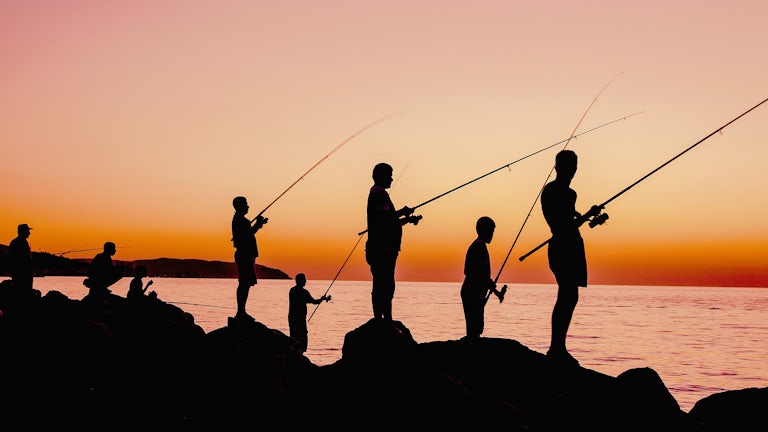Ensuring freshwaters for the future

Managing energy transfers to drive sustainable freshwaters.
Healthy upland rivers and streams provide a major source of clean drinking water and sustain all wildlife downstream, supporting key human activities including fisheries, agriculture and recreation. Despite this, freshwater ecosystems are amongst the most threatened in the world.
Our researchers found that transfers of energy by river ecosystems connect landscapes, river biodiversity and ecosystem services such as the provision of clean water or fish. Their findings led to policy changes that protect freshwater ecosystems in Wales and across the world.

Managing healthy freshwater ecosystems
In the UK, upland catchments are mostly managed to deliver goods and services with high market value - such as meat and timber. Often little consideration is given to the river organisms and processes that keep these freshwaters healthy, leading to the loss of biodiversity and water pollution.
Our expertise in freshwater ecosystems has improved the management of upland catchments, ensuring healthy freshwater ecosystems for current and future generations. Professor Isabelle Durance’s team led the DURESS project, a £3.2 million freshwater research programme, that demonstrated the value of sustainable catchment management on freshwater ecosystems.
By measuring and modelling variation in river ecosystems in Wales and England, the research quantified the missing link between landscape management, river biodiversity and the sustainability of a range of river ecosystem services key for human wellbeing.
This research was critical in developing a sustainable freshwater management programme at a UNESCO World Heritage Site in Africa, as well as prompting an overhaul of both the policy and practice of freshwater ecosystem management in Wales.

“Our project pioneered the idea that energy transfers drive the sustainability of freshwater ecosystem services and demonstrated management strategies that would help river biodiversity to thrive. This helps to ensure clean water and improved human wellbeing.”
Pioneering energy transfer through river systems
Professor Durance's team examined the link between biodiversity and ecosystem services through a fundamentally novel concept rooted in thermodynamics. Energy enters the river ecosystems through heat from the sun and carbon, through sources such as leaves. The research demonstrated that catchment management controls the amount of energy that enters the river ecosystems. The research evidences that the energy is transferred through the food chain from microbes to fish or birds. This concept provided first principles on which to guide landscape decisions.

The link between catchment use, freshwater biodiversity and ecosystem services
Through the DURESS project, the team developed the first tools and evidence directly linking biodiversity conservation efforts focused on the resilience of freshwater ecosystems to the sustainability of ecosystem services for future generations.

Linking freshwater ecosystem health to human wellbeing
Freshwaters not only provide support to industry, but also human wellbeing, through activities such as bird watching and recreational fishing.
The researchers provided the first conceptual tools to identify and account for these services, linking biodiverse freshwater ecosystems, ecosystem services and human well-being. This evidence was especially vital in areas of the world where the local, and often poorest, communities depend most on the free services their local river provides, including fishing and clean drinking water.
Visualising the impact of upland landscape on future ecosystem services
Uplands provide the majority of the UK’s drinking water. Ensuring the health of these water sources will be vital for human health. By engaging with 15 stakeholders, including Natural Resources Wales and Welsh Water, the researchers were able to shape management decisions that protect the provision of clean drinking water and other ecosystem services. The research has ensured the analyse of future drivers of change in UK uplands up to 2050.
Meet the team
Key contacts
Publications
- Worthington, T. A. et al. 2020. Testing the ecosystem service cascade framework for Atlantic salmon. Ecosystem Services 46 101196. (10.1016/j.ecoser.2020.101196)
- Perkins, D. M. et al., 2018. Bending the rules: exploitation of allochthonous resources by a top-predator modifies size-abundance scaling in stream food webs. Ecology Letters 21 (12), pp.1771-1780. (10.1111/ele.13147)
- Small, N. , Munday, M. and Durance, I. 2017. The challenge of valuing ecosystem services that have no material benefits. Global Environmental Change 44 , pp.57-67. (10.1016/j.gloenvcha.2017.03.005)
- Thomas, S. M. , Griffiths, S. W. and Ormerod, S. J. 2016. Beyond cool: adapting upland streams for climate change using riparian woodlands. Global Change Biology 22 (1), pp.310-324. (10.1111/gcb.13103)
- Durance, I. et al. 2016. The challenges of linking ecosystem services to biodiversity. Advances in Ecological Research 54 , pp.87-134. (10.1016/bs.aecr.2015.10.003)






